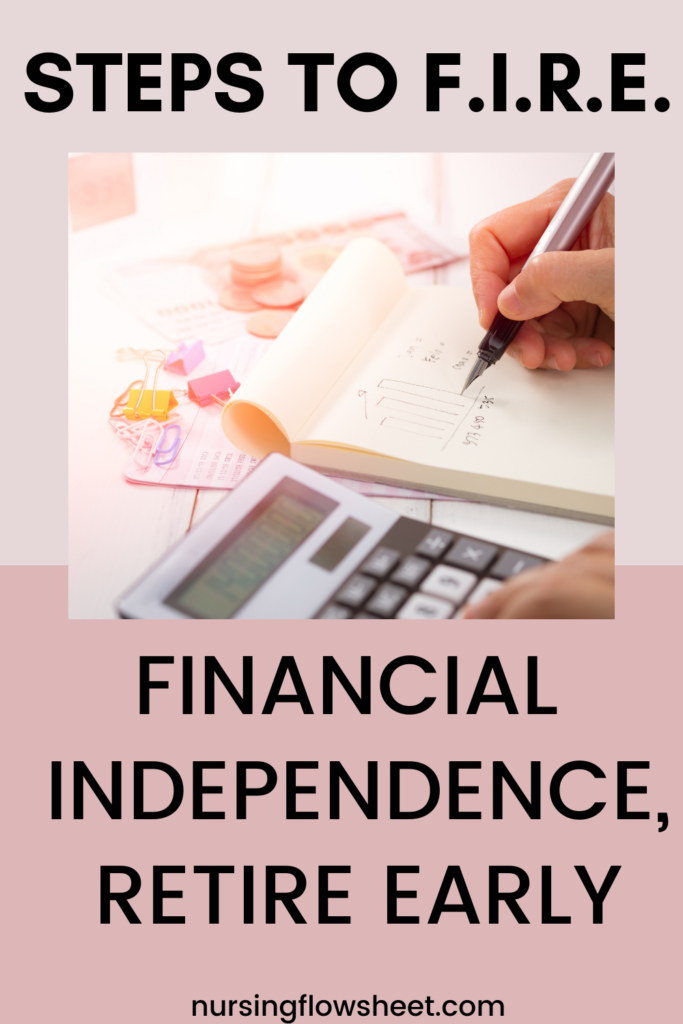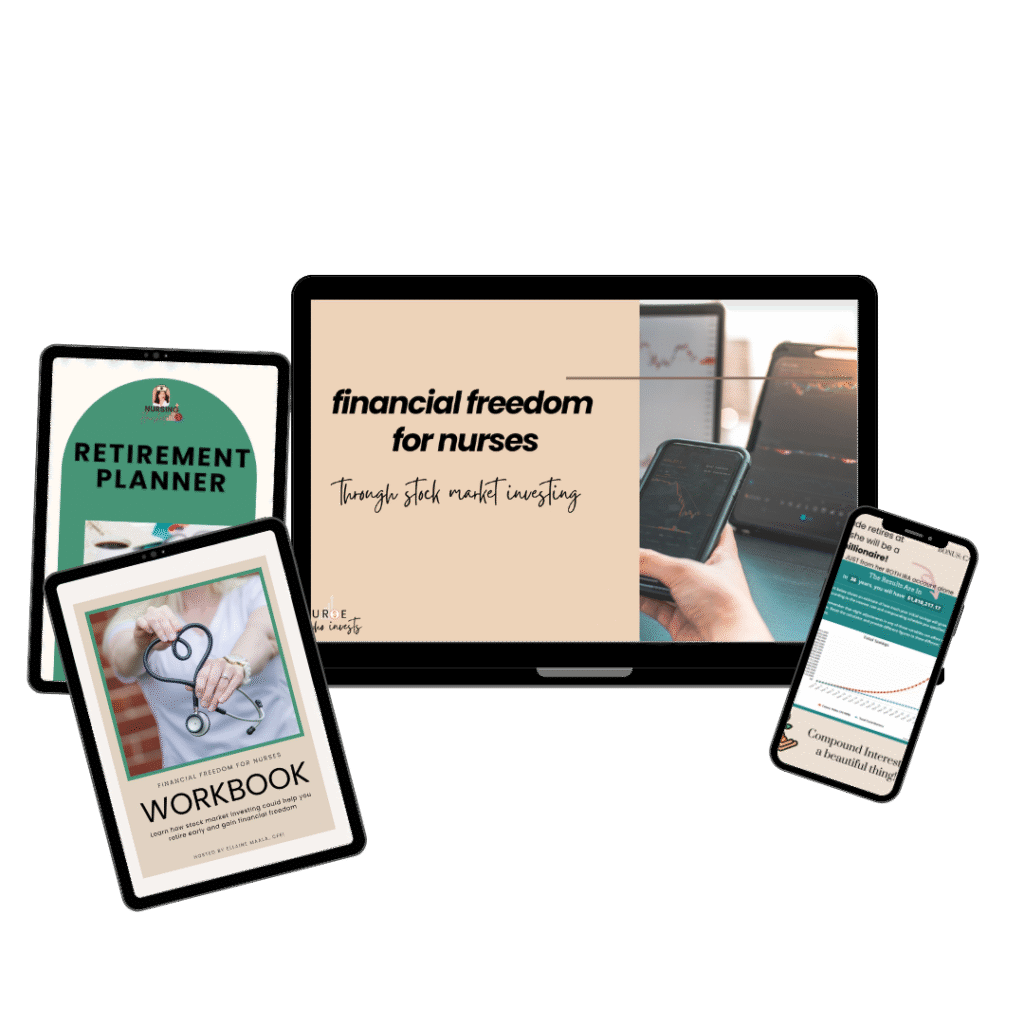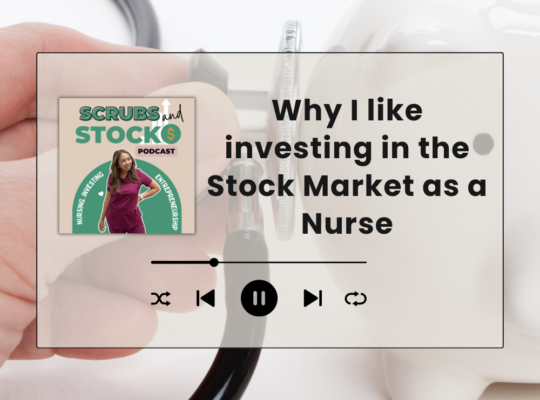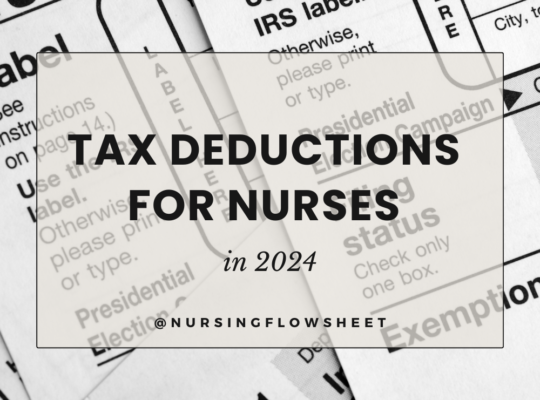The first time I heard about the Financial Independence, Retire Early (FIRE) movement was 5 years ago. This was when I stumbled upon a video on YouTube about retiring early. At that time, I have been a nurse for over 6 years and the burn out was real. I was about to finish my Master’s degree and in the hunt for a new career.

I became very interested in the FIRE movement because the idea of working FULL TIME for another 40 years as a nurse is something I didn’t look forward to especially after going through a pandemic the last 2-3 years. My mother worked as a nurse for 20+ years and a broken back, and I told myself that I did not want to be like that.
Before we get into my steps to achieve financial independence so you can retire or RELAX early, I want to stress the importance of a strong financial foundation. FIRE requires motivation, focus, sacrifice and a strong financial foundation increases the likelihood of achieving your goals.
A strong financial foundation means having a clear picture of your financial health including knowing your credit score & what goes in and out of your accounts. You have an emergency fund, in the process of paying off your debt.
Once you have your financial foundation set, it’s time to make some money moves!
First of all, what is Financial Independence, Retire Early (FIRE) Movement?
FI stands for FINANCIAL INDEPENDENCE
Financial independence is when you have built enough wealth to live a comfortable life, no longer needing to work for money.
RE stands for RETIRE REALY
Retiring early has different meanings for everyone. For some, retiring early means quitting your job at age 35 and never working again for the rest of your life. While, for others it might just simply mean being able to make working full time optional and have more time to do what they love.
In my case, I actually love working in healthcare and taking care of patients so I want to continue working as a NP even after I “retire”. I’d probably only do it part-time so I can spend more time with my kids or enjoy my hobbies.
When you put FI and RE together you get FIRE.
But FIRE is more than just about money or personal finance optimization, it’s more about life optimization. The central question is “What makes you happy?” and aligning your spending and saving, and financial life around maximizing your happiness.
Financial Independence Retire Early (FIRE) is ultimately a personal journey.

How to Achieve Financial Independence and Retire Early as a Nurse
1. Change your relationship with money
The first step really is to change your mindset when it comes to money. Money mindset is the key. Believe that you are deserving of money. A lot of our financial mindset stems from our childhood experiences and how we were raised. Most of our traumas from the past that hinders us from believing that we deserve more money.
They say that You become the sum of the 5 people you spend the most time with. Because of this, you have to start surrounding yourself with people in the financial position you desire. Talk with them about how they have lifted and shifted their beliefs. Yours will begin to shift too. You can release these from your own reality by talking to people in your family, community, or online who are similar to you.
2. Get out of debt
NOT ALL DEBT IS BAD. But ideally, you’d like to remove as much debt as you can especially those with high interest. Sometimes debt keeps you from investing or holding you off from retirement planning.
Debt can be crippling so it’s best to tackle them one at a time. Check out my favorite debt repayment strategies here.
3. Lower some expenses
If you want to cut down on expenses, try to cut one on of the three big expenses: Housing, Transportation and Food.
The FIRE community suggests that your housing should be less than 25% of your take home pay (quite aggressive I’d say). I live in a suburban city in California that has lower housing costs but still decent pay. We pay around $1700 mortgage in our first house & ended up renting it out to get a bigger house (and our dream house) since we decided to stay here for a long time. As long you keep your housing a little less than 50% of your take home pay then you should be good.
For transportation, sticking to used cars is really the way to go and helps you get out of debt but you do what works for you.
Food is one of those areas that people tend to overspend. Some ways to cut down on food expenses is meal planning and eating out less.
4. Use rewards credit cards
Rewards credit cards give you the opportunity to stretch your dollar a little more. I honestly did not know the benefits and perks of using your credit card wisely. Our family loves traveling and does it every year. I just opened a travel credit card last year from American Express and now have over 200k in points, points that I can use to book FREE tickets to travel more.
Not only you earn points, but you also get cash backs for some credit cards. One of my credit cards give 3x cash back on groceries. What this means is that the card gives you the opportunity to earn $3 cash back for every $100 you spend—so if you spend $6,000 on groceries per year (that’s $500 per month), you could earn $180 of cash back every year.
Here are some of the credit cards I own and recommend:
5. Lower tax liability by maxing out tax deferred options
Tax deferred options can include a 401k, 457, 403b, or IRA for retirement, an HSA for tax deferred savings on health related costs, or a 529 plan for tax deferred money towards educational costs.
Contributing to these investment accounts can lower your taxable income.
Read more on taxes deductions for nurse
6. Increase your income
In order to achieve financial independence, you will most likely need to increase your income. Some of the ways I’ve tried to increase my income is by starting side hustles, switched to a better paying job and negotiated my salary.
Over my 11 years in nursing, I have almost 3x my salary just by advancing my degree. This has helped me increasing my saving rate so I can achieve financial independence early
7. Invest with low-cost index funds
Low cost index funds are my favorite type of investments. The reason why is because they are basically an easy way to invest money for a low fee in an index, instead of an actively managed fund where you’d pay a professional to pick stocks for you, which comes with higher management fees. In fact, it’s just one of the ways that Lexington Law recommends creating more passive income, read more here.
8. Define your own version of the 4% rule
The 4% rule is relatively simple: You add up all of your investments, and withdraw 4% of that total during your first year of retirement. In subsequent years, you adjust the dollar amount you withdraw to account for inflation.
This is how most people in the FIRE movement calculate how much they need to invest to achieve FIRE. However, 4% rule is very different for everyone considering different goals, income, expenses and circumstances.
If you want to retire early, You need a plan.
There are also a lot of types of financial freedom including FAT FIRE, COAST FIRE, BARISTA FIRE, LEAN FIRE.

Take some time to actually come up with your target number. This way, your money is accounted for and the likelihood you’ll stay motivated towards your goal increases.
How I can Help You get to your FIRE

FI/RE workshop for Nurses: ENROLL HERE
My goal ultimately is to be able to make my work optional. By doing this, I will be able to enjoy doing what I love to do and have the time freedom I want.
So, what do you think about the FIRE movement? comment down below!







